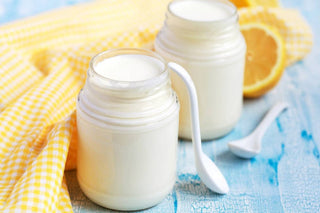Lactoferrin-enriched fermented milk improves acne by reducing total lesions and sebum content in young adults with moderate acne, researchers report in the journal Nutrition.
Acne is an inflammatory skin condition that affects the vast majority of the population at some point in time. A pimple, correctly known as comeodone, can be open or closed; inflammatory or non-inflammatory. Propionibacterium acnes or P. acnes, a bacterium that normally resides on the skin, plays a role by secreting pro-inflammatory byproducts, which leads to larger inflammatory lesions.
In recent years, a number of studies have found an association between diet and acne. Loren Cordain, PhD has found that a low glycemic index diet improves the symptoms of acne.
Other studies have found supplementing with Omega-3 polyunsaturated fats (e.g., flax seed oil, fish oil) decreases inflammatory acne by promoting the development of anti-inflammatory compounds. Probiotics like Lactobacillus bulgaricus and acidophilus which inhibit pro-inflammatory compounds also improve acne.
Lactoferrin has also shown to decrease skin inflammation due to its broad antibacterial and anti-inflammatory activities. Lactoferrin (lacto or milk; ferrous or iron) is a protein found in high concentrations in secretions of the body such as saliva, tears, and nasal secretions. Lactoferrin is also found in mother’s first milk, or colostrum, providing antibacterial activity to infants.
Through its iron-binding properties, lactoferrin deprives P. acnes from an element necessary for its growth. Lactoferrin is commercially derived from whey milk protein after removing precipitated casein.
To better understand the relationship between lactoferrin and acne, researchers at the Department of Dermatology at Kyung Hee Medical Center in Seoul recruited 36 young men and women with mild to moderate acne.
During the 12 week study, half of the group ingested fermented milk (milk products fermented with lactic acid bacteria to improve taste, digestibility and shelf-life such as yogurt, kefir, buttermilk, sour cream) with 200 mg of lactoferrin daily. The control group drank just fermented milk (probiotics) each day.
Acne lesion counts and acne grade were assessed initially and at monthly visits. At baseline and at 12 weeks, the condition of skin was assessed by hydration, sebum, pH and skin surface lipids.
At the study’s conclusion, participants in the lactoferrin group showed significant improvement in their acne. The inflammatory lesion count decreased by 38.6%; the total lesion count decreased by 23.1% and the acne grade decreased by 20.3% in the lactoferrin group compared with the placebo group.
The dermatologic improvement of acne in the treatment group was also accompanied by a significant decrease in sebum content, which is overproduced in acne. Sebum content in lactoferrin group decreased by 31.1% compared with placebo.
The amount of total skin surface lipids decreased in both groups. Two types of major lipids decreased in the lactoferrin group; but just one type decreased in the control group. The reduction in this additional lipid in the lactoferrin group was highly correlated with the decreases in serum content, acne lesion counts and acne grade.
The researchers concluded that the greater efficacy of lactoferrin over probiotics may be associated with the greater ability of lactoferrin to decrease skin surface lipids and sebum content, thereby decreasing clogged pores and inflammation associated with P. acnes bacteria.
The Bottom Line
While most dermatologists seem to discount the role of diet with acne, recent studies like this one prove otherwise.
If you or a loved one has problem skin, the first thing to address is diet and lifestyle.
You can also augment your diet with our Probiotic-8, which contains beneficial bacteria to like that found in this study to help clear your skin. Clear Skin Formula and Clear Skin Formula PLUS – two supplements formulated with vitamins, minerals and botanicals to support healthy skin.

